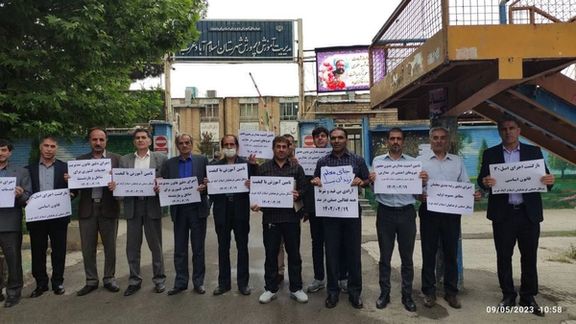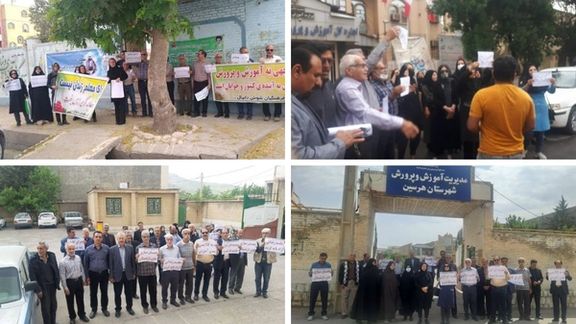Iranian Teachers Stage Mass Protests Against Regime

The nationwide gathering of Iranian teachers in protest at livelihood issues and chemical attacks on schoolgirls was held in several cities across Iran on Tuesday.

The nationwide gathering of Iranian teachers in protest at livelihood issues and chemical attacks on schoolgirls was held in several cities across Iran on Tuesday.
The Coordinating Council of Teachers' Union Organizations had called for further protests last week just hours after the Supreme Leader failed to address nationwide school poisonings.
The rallies were scheduled as a tribute to Jabbar Baghcheban, also known as Mirza Jabbar Asgarzadeh, an Iranian inventor and educator born on May 9, 1886, who established the first Iranian kindergarten and the first deaf school.
The council stressed the necessity of ending the "dominance of the ruling totalitarian ideology" in Iranian schools, claiming the current incompetent managers of the educational system should be replaced by those educated under more modern, secular pedagogy.
In addition to their usual demands such as better salaries and working conditions, the teachers’ council reiterated that Iran’s education system will not improve without a fundamental change.
In response, teachers in the cities of Kermanshah, Arak, Shush, Ahvaz, Torbat Heydarieh, Hamedan, Sanandaj, Eslamabad-e Gharb, Qazvin, Esfahan and Harsin gathered in front of the Education Departments on Tuesday.
Gatherings were held peacefully in some cities, but in Sanandaj west of Iran and Esfahan in the center the police force attacked protesters.

Hengaw Human Rights Organization, a Kurdish rights group, reported that the security forces have kidnapped two teachers in the city.
In its final statement, The Coordinating Council of Teachers' Union Organizations slammed the ideological indoctrination in textbooks, creating psychological insecurity and threatening the female students, and urged attention to the livelihood of the teachers.
“The goal of the education system is not to train citizens, but to train soldiers aligned with the narrow-minded indoctrination of totalitarian ideology," reads the statement.
Referring to the nationwide uprising following the death in custody of Mahsa Amini, the statement added what was seen in the schools and streets was the failure of a model that ignores the deep changes in society which wants to achieve its unrealistic ideals in the educational system.
Hundreds of schools in the Iranian provinces have been attacked by unidentified gases since November 30 when the first case of poisoning among schoolgirls was reported in the religious city of Qom. However, the government has not taken any tangible measures to identify and pursue the perpetrators, nor to explain to terrified parents and students what was happening, other than a few staged arrests. It is impossible such wide scale attacks could happen without regime approval.
Thousands of students have been affected, mostly girls, with hundreds hospitalized with symptoms including respiratory distress, numbness in their limbs, heart palpitations, headaches, nausea, and vomiting.
Critics of the regime say the attacks are part of a crackdown on protests, a claim denied by government officials who have claimed the symptoms are the result of mass hysteria.
Families of students have staged protest rallies urging officials to hold classes virtually rather than in school to protect children from further attacks.